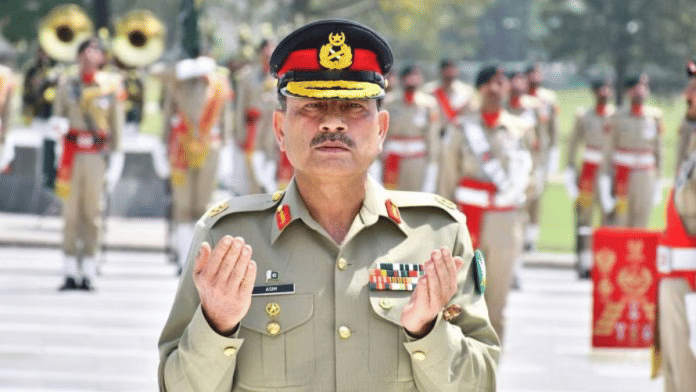New Delhi: The Pakistani armed forces are set to see an institutional overhaul Thursday—the first in almost five decades—with Field Marshal Asim Munir poised to take over as the first “Chief of Defence Forces”, making him the commander of all the three services—the army, air force and navy.
This big overhaul comes as part of changes made to the military through the contentious 27th Amendment to the Pakistani Constitution that comes into force tomorrow.
The amendments abolished the position of Chairman of the Joint Chiefs of Staff Committee (CJCSC)—a position created in 1976 following structural changes introduced in the military as a consequence of Pakistan’s loss in the 1971 war with India.
Current CJCSC General Sahir Samshad Mirza will retire tomorrow, thereby bringing an end to this institution established in 1976 by former Prime Minister Zulfikar Ali Bhutto.
The CJCSC theoretically was meant to coordinate efforts between the tri-services, while maintaining balance between the army, air force and navy.
But Pakistan’s army has for long wielded power in the country. Of 18 CJCSCs appointed till date, 15 have been from the army.
The amendment passed earlier this month states that the President, on the advice of the Prime Minister, will appoint the Chief of Army Staff (COAS), who will concurrently serve as the CDF, for a term of five years. This change effectively unified the country’s military under the army chief.
All-powerful Army?
The amendments extend Munir’s tenure as the head of Pakistan’s armed forces till at least 2030.
He would have naturally retired Thursday itself, but an amendment last year increased the tenure of the service chiefs from three years to five years, pushing his regular retirement date to 27 November 2027.
However, he will stay as CAF till 2030. Interestingly, the amendment has the provision of allowing an extra tenure to the CDF.
The changes also give him legal cover equivalent to that of the country’s President.
The CDF cannot be prosecuted, though the protection has also been extended to the air force and navy chiefs too.
Primacy of Pakistan’s army could be reinforced if the CDF gets to influence promotions within the three forces. Currently, there is a lack of clarity on who manages the promotions of officers within the Air Force and Navy, according to analysis by local media.
The amendments also reduce the government’s oversight over the Army, according to Dawn. The CDF/Army chief now recommends appointment to the position of Vice Chief of Army Staff (VCOAS), which will then be authorised by the federal government. Earlier, it was the executive’s prerogative to make these appointments.
In the past, Pakistan’s military rulers Zia Ul-Haq and Pervez Musharaf had appointed VCOAS’ to run the Army while they focused on ruling the country, the Dawn noted.
But, the report speculates, Munir is unlikely to appoint a Vice Chief of Army Staff just yet.
In addition to these powers, the Army will also play a key role in deciding the head of National Strategic Command (NSC), which oversees Islamabad’s nuclear arsenal. The amendments indicate that the commander will be appointed from the Army by the executive on the advice of the Army chief/CDF.
The amendments and Munir’s ascension as CDF come months after India and Pakistan engaged in an 87-hour conflict in May this year. India hit terrorist complexes across Pakistan and Pakistan-occupied Jammu & Kashmir (PoJK) in the aftermath of the Pulwama attack. Munir was appointed field marshal 10 days after the two countries agreed to pause hostilities.
On the other side, tensions between Islamabad and Taliban-led Afghanistan have escalated, and the Pakistan Army has carried out operations against the outfit Tehreek-i-Taliban (TTP) within its borders.
(Edited by Prerna Madan)
Also Read: Constitutional coup as Pakistan’s 27th Amendment makes Munir Field Marshal for life & total immunity






